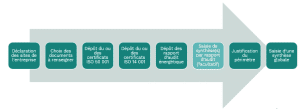Article 8 of the European Climate-Energy Package Directive requires large companies to carry out an energy audit every 4 years since 2015.
What is it about ?
The DDADUE law (Various Provisions for Adaptation to European Union Law) standard NF EN 16247 requires large companies to implement an energy efficiency strategy for their buildings . Thus, it requires the carrying out of an energy audit to be renewed every 4 years in order to identify the energy sources of their activities.
Who is affected ?
The audit applies to companies that are not SMEs within the meaning of the European definition. The companies concerned are therefore legal entities which exceed one of the following two thresholds over two consecutive financial years:
- 250 people (UTA)
Or
- A turnover exceeding €50 million and a balance sheet exceeding €43 million
When there are less than 250 people, the two thresholds of the financial criterion must be met (turnover and balance sheet) to be an obligatory company under these regulations.
Legal entities newly required to carry out their first energy audit within six months . The six-month period is understood to be from the event giving rise to the obligation consisting of the observation that one of the aforementioned thresholds has been exceeded at the end of two consecutive accounting years.
A new legal entity can wait until it has its first two accounting years to initiate the fulfillment of the obligation but it is recommended to launch the audit or energy management system process before this observation, for example for an entity which knows itself to be sustainably beyond the workforce criterion in the event of the option of an energy management system which requires a period of more than 6 months for its implementation and certification.
How it works?
The audit covers 80% of the energy bill* in the following 3 areas: buildings, industrial processes, transport. The audit report must be submitted on the ADEME platform.
*all energy-related expenses: heating, electricity, but also fuel for the automobile fleet
Buildings engaged in an ISO 50 001 process are exempt.
The audit must be certified by qualified external or internal auditors OPQIBI, LNE, AFNOR or I. CERT.
What deadline ?
The next deadline is December 5, 2023.
What are the penalties ?
In the absence of an audit, the company risks a fine of 2% of turnover , increased to 4% in the event of a repeat offense.
How useful are ddadue audits? ?
The audit is an ideal tool to support decision-making and prioritization of energy performance actions:
- Reduce the operating costs of your sites
- Detect the most energy-intensive buildings
- Increase the comfort of your employees and customers
- Enhance your heritage
- Develop a sustainable environmental policy
Sobre Energie carries out audits for the La Poste Group and can support you in your approach: we offer digital audits on our energy management platform. Objective: comply with regulations and prioritize your energy performance actions, based on scenarios in euros, kWh and CO2.
To find out more, make an appointment here
🤖 Summarize this article with an AI
Click on a button to automatically sum up this page with the AI of your choice.

